
Nebraska History posts materials online for your personal use. Please remember that the contents of Nebraska History are copyrighted by the Nebraska State Historical Society (except for materials credited to other institutions). The NSHS retains its copyrights even to materials it posts on the web.
For permission to re-use materials or for photo ordering information, please see: http://www.nebraskahistory.org/magazine/permission.htm
Nebraska State Historical Society members receive four issues of Nebraska History and four issues of Nebraska History News annually. For membership information, see: http://nebraskahistory.org/admin/members/index.htm
Article Title: George Howard Gibson, Christian Socialist Among the Populists
Full Citation: Samuel Walker, “George Howard Gibson, Christian Socialist Among the Populists,” Nebraska History 55 (1974): 553-572
URL of article: http://www.nebraskahistory.org/publish/publicat/history/full-text/NH1974GHGibson.pdf Date: 11/03/2014
Article Summary: Gibson’s brief and stormy association with the Nebraska Populists ended because his philosophical beliefs were more radical than theirs. He dreamed of a transformation of society and staunchly opposed the widely-supported issue of free silver.
Cataloging Information:
Names: George Howard Gibson, George D Herron, Henry Demarest Lloyd, William Jennings Bryan, William V Allen, Eugene V Debs
Keywords: George Howard Gibson, Populism, Alliance Independent, Wealth-Makers, Nebraska Independent, Christian Socialism, temperance, Omaha Platform, George D Herron, Social Gospel Movement, free silver, William Jennings Bryan, fusion, overproduction, William V Allen, American Railway Union (ARU), Eugene V Debs, Christian Corporation
Photographs / Images: Jay Burrows; William V Allen; cartoon titled “See him ‘swat ‘em’ both” (Wealth Makers, January 31, 1895); name plate and part of an article showing news of the election of Governor Silas A. Holcomb (Wealth Makers, November 8, 1895)
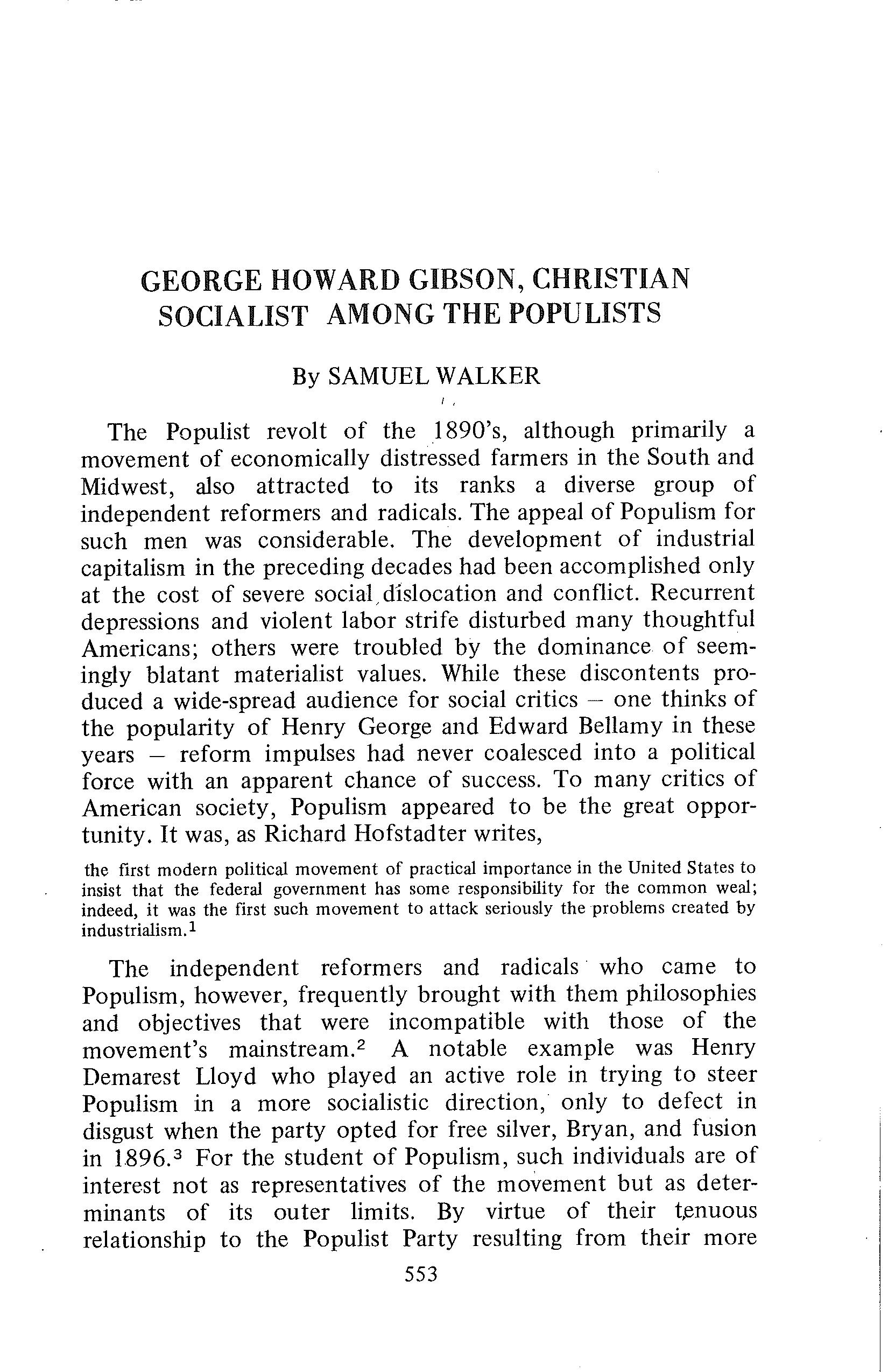
GEORGE
HOWARD GIBSON, CHRISTIAN SOCIALIST AMONG THE POPULISTS
By SAMUEL WALKER
The Populist revolt of the 1890's, although primarily a movement of economically distressed farmers in the South and Midwest, also attracted to its ranks a diverse group of independent reformers and radicals. The appeal of Populism for such men was considerable. The development of industrial capitalism in the preceding decades had been accomplished only at the cost of severe social, dislocation and conflict. Recurrent depressions and violent labor strife disturbed many thoughtful Americans; others were troubled by the dominance of seemingly blatant materialist values. While these discontents produced a wide-spread audience for social critics - one thinks of the popularity of Henry George and Edward Bellamy in these years - reform impulses had never coalesced into a political force with an apparent chance of success. To many critics of American society, Populism appeared to be the great opportunity. It was, as Richard Hofstadter writes, the first modern political movement of practical importance in the United States to insist that the federal government has some responsibility for the common weal; indeed, it was the first such movement to attack seriously the problems created by industrialism.l
The independent reformers and radicals who came to Populism, however, frequently brought with them philosophies and objectives that were incompatible with those of the movement's mainstream. 2 A notable example was Henry Demarest Lloyd who played an active role in trying to steer Populism in a more socialistic direction, only to defect in disgust when the party opted for free silver, Bryan, and fusion in 1896. 3 For the student of Populism, such individuals are of interest not as representatives of the movement but as determinants of its outer limits. By virtue of their tenuous relationship to the Populist Party resulting from their more 553

554 NEBRASKA HISTORY
radical political views, they help to clarify what the movement was and was not. The case of Lloyd, for example,illuminates the limits of Populist collectivism.
The Nebraska Populist movement attracted such an individual in George Howard Gibson, a devout Christian Socialist who served as the editor of the state Populist official organ, the Alliance-Independent (which he renamed the Wealth Makers), from October, 1893, through Januaty, 1896. 4 These were critical years for Populism as it moved steadily toward its rendezvous with free silver, Bryan and fusion in 1896. Furthermore, in Nebraska Bryan began experimenting with the fusion strategy that he would successfully employ on the national level in 1896. 5
Gibson took the Omaha platform as his touchstone, but reinterpreted it in the light of Christian Socialism. His philosophical beliefs were antithetical to those of the Populist mainstream, and on the level of political strategy, he staunchly opposed the increasingly popular issue of free silver. The resulting conflict between the Nebraska movement and its official organ illuminates the evolving character of Populist program and strategy in the critical years prior to 1896.
George Howard Gibson began his career as journalistreformer in Omaha in the late 1880's as the owner-editor of a monthly temperance publication, the Rising Tide (later the Omaha Leader). That venture collapsed after the defeat of a prohibition amendment by Nebraska voters in the general elections of 1890. 6 He then moved to Lincoln where he found employment with the Alliance, the weekly official organ of the state Farmer's Alliance and the Peoples Independent Party. During the next three years he served in various capacities: as local editor and ad solicitor, contributor of occasional poems and book reviews, temporary editor in 1892, and as Chicago correspondent in 1893.7 The election of Populist William V. Allen to the United States Senate in 1893 created several positions in Washington and the Alliance-Independent lost its editorial staff. In October Gibson was appointed editor. 8
Assuming his new position, Gibson made no secret of his Christian Socialism, introducing himself to his readers with the following credo:
I believe, religiously, morally and very definitely in the fatherhood of God and the
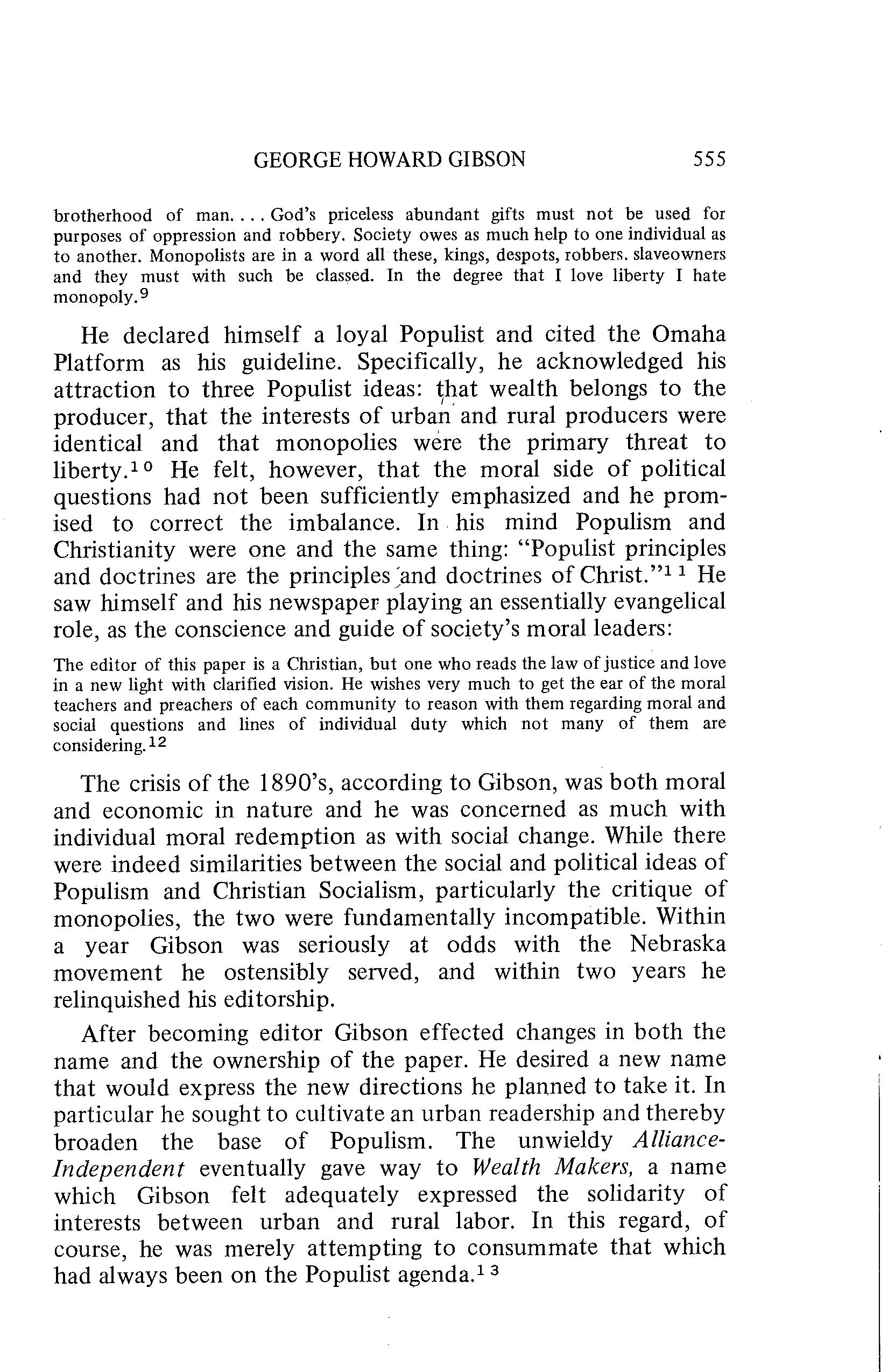
GEORGE HOWARD GIBSON 555
brotherhood of man God's priceless abundant gifts must not be used for purposes of oppression and robbery. Society owes as much help to one individual as to another. Monopolists are in a word all these, kings, despots, robbers. slaveowners and they must with such be classed. In the degree that I love liberty I hate monopoly,9
He declared himself a loyal Populist and cited the Omaha Platform as his guideline. Specifically, he acknowledged his attraction to three Populist ideas: that wealth belongs to the I' producer, that the interests of urban and rural producers were identical and that monopolies were the primary threat to liberty. 1 0 He felt, however, that the moral side of political questions had not been sufficiently emphasized and he promised to correct the imbalance. In his mind Populism and Christianity were one and the same thing: "Populist principles and doctrines are the principles )nd doctrines of Christ. " 1 1 He saw himself and his newspaper playing an essentially evangelical role, as the conscience and guide of society's moral leaders: The editor of this paper is a Christian, but one who reads the law of justice and love in a new light with clarified vision. He wishes very much to get the ear of the moral teachers and preachers of each community to reason with them regarding moral and social questions and lines of individual duty which not many of them are considering.12
The crisis of the 1890's, according to Gibson, was both moral and economic in nature and he was concerned as much with individual moral redemption as with social change. While there were indeed similarities between the social and political ideas of Populism and Christian Socialism, particularly the critique of monopolies, the two were fundamentally incompatible. Within a year Gibson was seriously at odds with the Nebraska movement he ostensibly served, and within two years he relinquished his editorship.
After becoming editor Gibson effected changes in both the name and the ownership of the paper. He desired a new name that would express the new directions he planned to take it. In particular he sought to cultivate an urban readership and thereby broaden the base of Populism. The unwieldy AllianceIndependent eventually gave way to Wealth Makers, a name which Gibson felt adequately expressed the solidarity of interests between urban and rural labor. In this regard, of course, he was merely attempting to consummate that which had always been on the Populist agenda.l 3
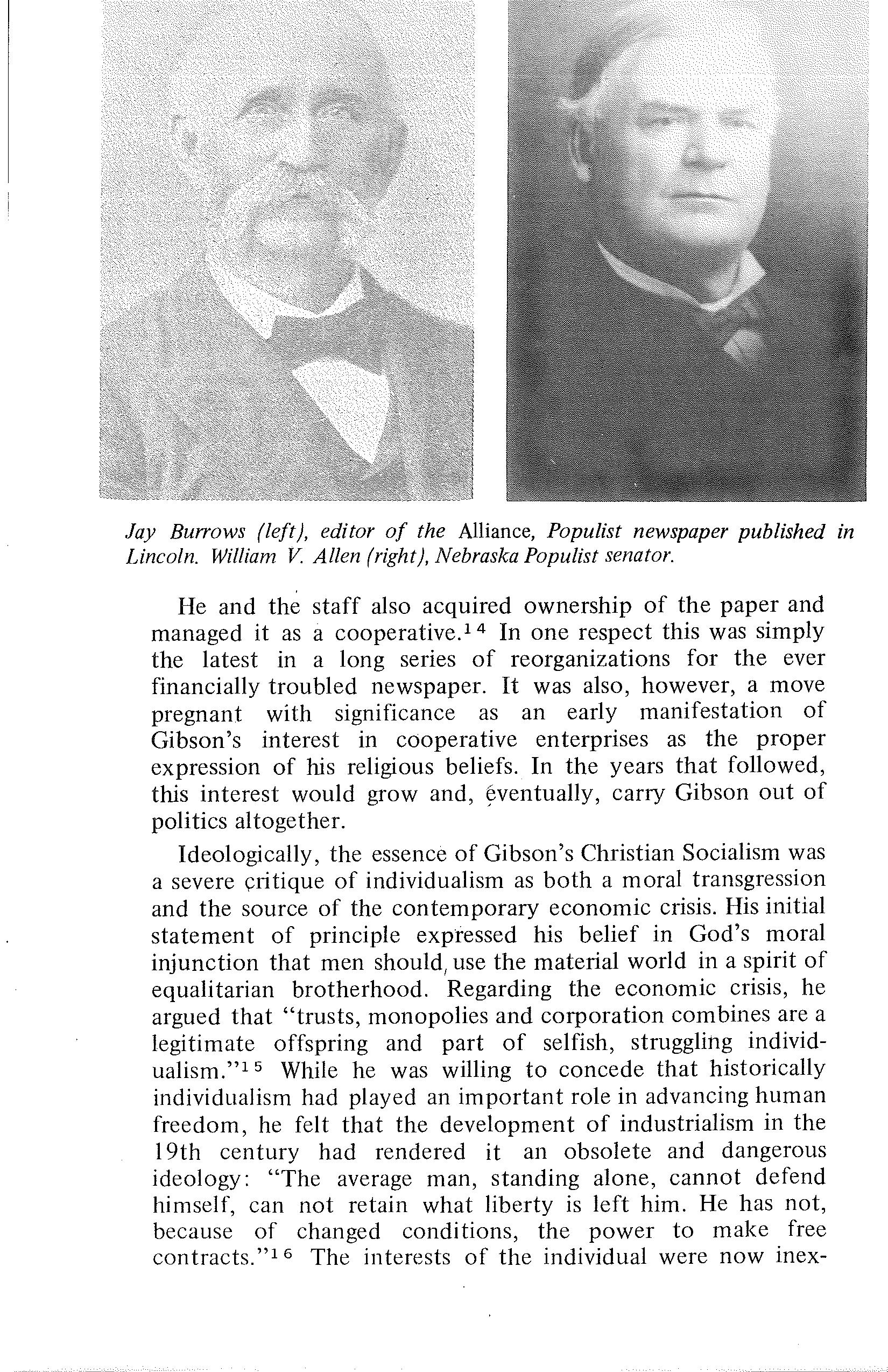
He and the staff also acquired ownership of the paper and managed it as a cooperative. 14 In one respect this was simply the latest in a long series of reorganizations for the ever financially troubled newspaper. It was also, however, a move pregnant with significance as an early manifestation of Gibson's interest in cooperative enterprises as the proper expression of his religious beliefs. In the years that followed, this interest would grow and, carry Gibson out of politics altogether.
Ideologically, the essence of Gibson's Christian Socialism was a severe c,;ritique of individualism as both a moral transgression and the source of the contemporary economic crisis. His initial statement of principle expressed his belief in God's moral injunction that men should, use the material world in a spirit of equalitarian brotherhood. Regarding the economic crisis, he argued that "trusts, monopolies and corporation combines are a legitimate offspring and part of selfish, struggling individualism."1 5 While he was willing to concede that historically individualism had played an important role in advancing human freedom, he felt that the development of industrialism in the 19th century had rendered it an obsolete and dangerous ideology: "The average man, standing alone, cannot defend himself, can not retain what liberty is left him. He has not, because of changed conditions, the power to make free contracts." 16 The interests of the individual were now inex-
Jay Burrows (left), editor of the Alliance, Populist newspaper published in Lincoln. William V Allen (right), Nebraska Populist senator.
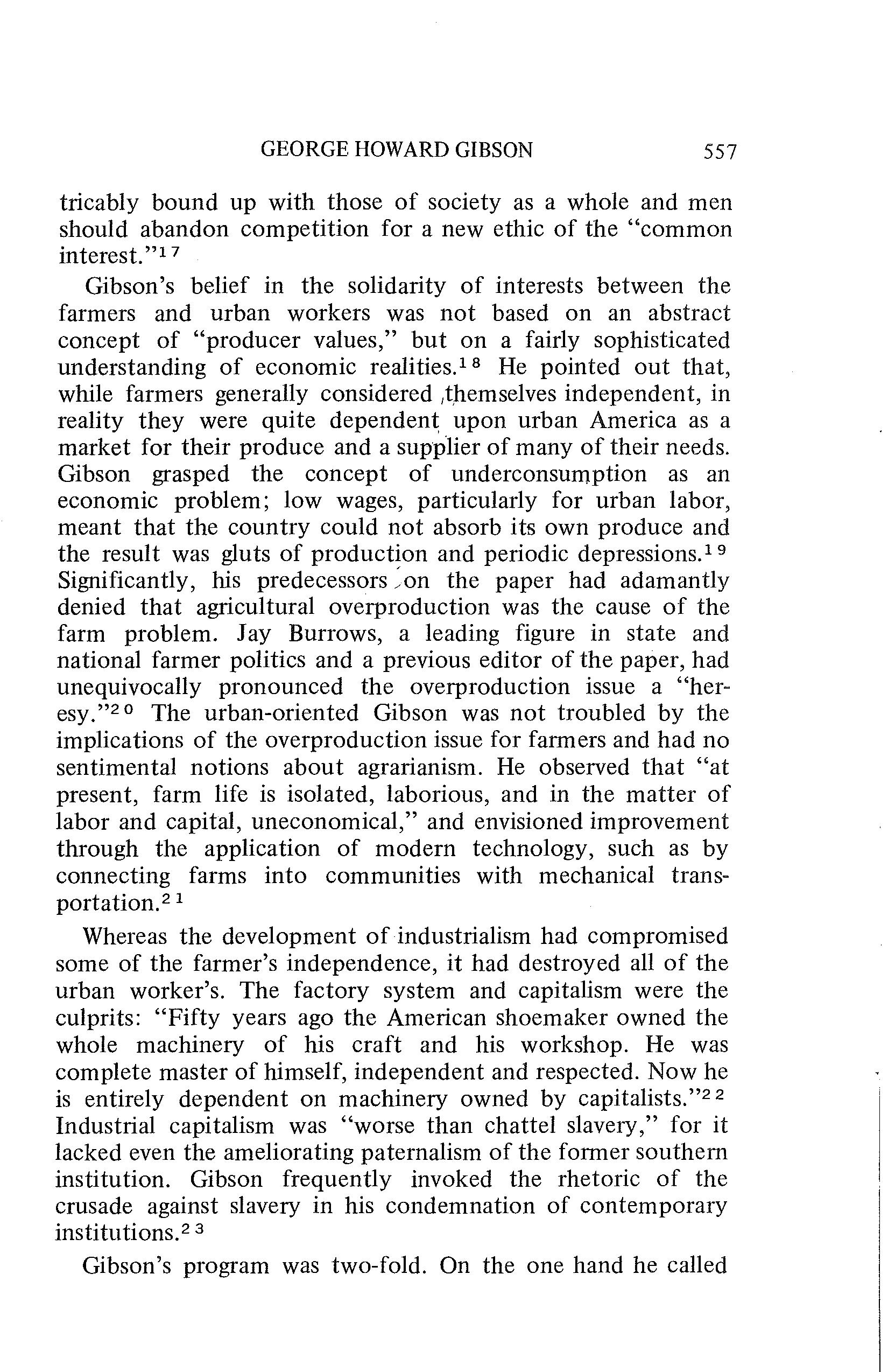
GEORGE HOWARD GIBSON 557
tricably bound up with those of society as a whole and men should abandon competition for a new ethic of the "common interest." 1 7
Gibson's belief in the solidarity of interests between the farmers and urban workers was not based on an abstract concept of "producer values," but on a fairly sophisticated understanding of economic realities. 1 8 He pointed out that, while farmers generally considered ,t.hemselves independent, in reality they were quite dependent upon urban America as a market for their produce and a supplier of many of their needs. Gibson grasped the concept of underconsumption as an economic problem; low wages, particularly for urban labor, meant that the country could not absorb its own produce and the result was gluts of production and periodic depressions. 1 9
Significantly, his predecessors the paper had adamantly denied that agricultural overproduction was the cause of the farm problem. Jay Burrows, a leading figure in state and national farmer politics and a previous editor of the paper, had unequivocally pronounced the overproduction issue a "heresy. " 2 0
The urban-oriented Gibson was not troubled by the implications of the overproduction issue for farmers and had no sentimental notions about agrarianism. He observed that "at present, farm life is isolated, laborious, and in the matter of labor and capital, uneconomical," and envisioned improvement through the application of modern technology, such as by connecting farms into communities with mechanical transportation. 2 1
Whereas the development of industrialism had compromised some of the farmer's independence, it had destroyed all of the urban worker's. The factory system and capitalism were the culprits: "Fifty years ago the American shoemaker owned the whole machinery of his craft and his workshop. He was complete master of himself, independent and respected. Now he is entirely dependent on machinery owned by capitalists." 2 2 Industrial capitalism was "worse than chattel slavery," for it lacked even the ameliorating paternalism of the former southern institution. Gibson frequently invoked the rhetoric of the crusade against slavery in his condemnation of contemporary institutions. 2 3
Gibson's program was two-fold. On the one hand he called
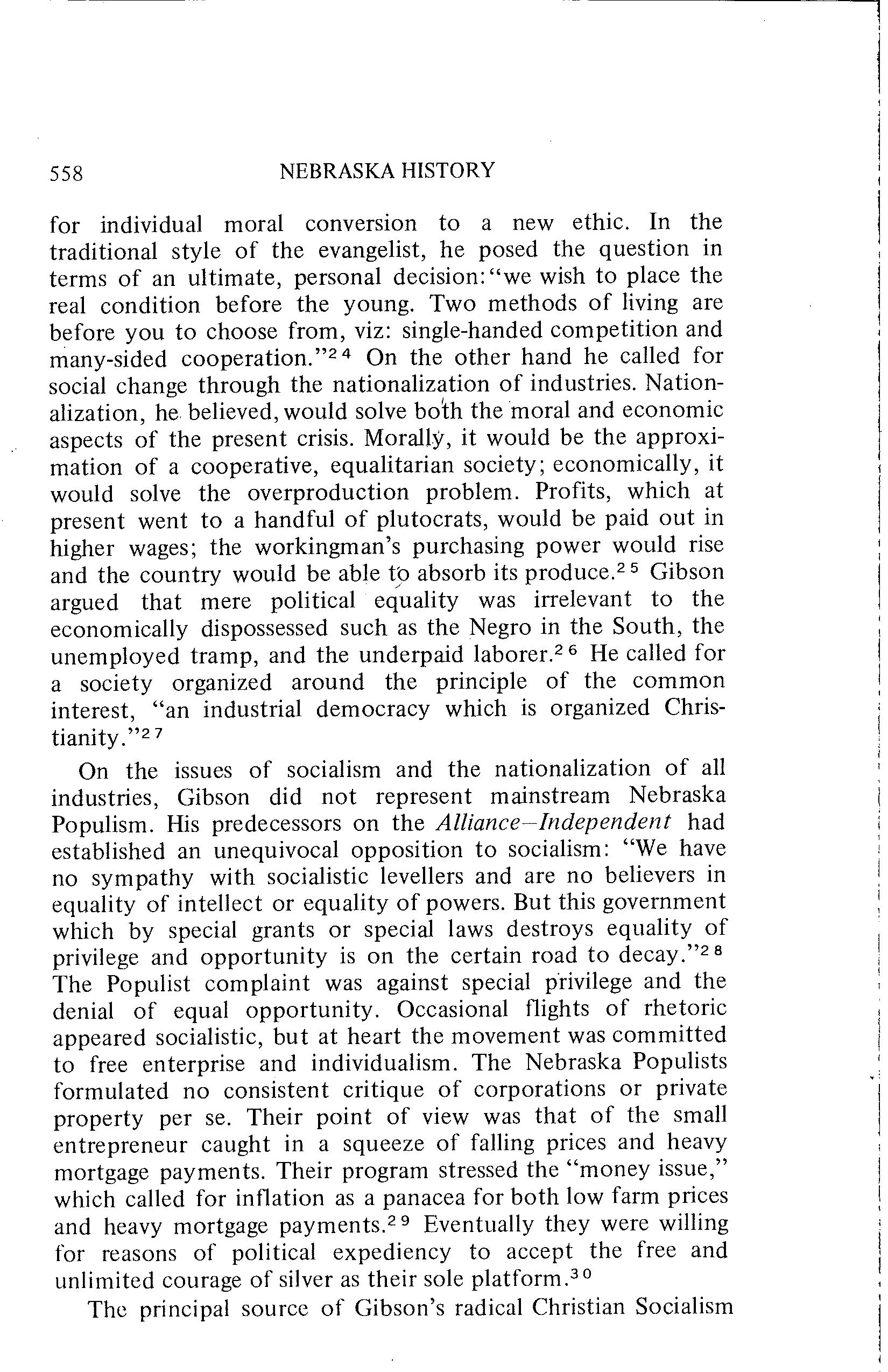
558 NEBRASKA HISTORY
for individual moral conversion to a new ethic. In the traditional style of the evangelist, he posed the question in terms of an ultimate, personal decision: "we wish to place the real condition before the young. Two methods of living are before you to choose from, viz: single-handed competition and many-sided cooperation. " 2 4 On the other hand he called for social change through the nationalization of industries. Nationalization, he believed, would solve both the moral and economic aspects of the present crisis. Morally, it would be the approximation of a cooperative, equalitarian society; economically, it would solve the overproduction problem. Profits, which at present went to a handful of plutocrats, would be paid out in higher wages; the workingman's purchasing power would rise and the country would be able tb absorb its produce. 2 5 Gibson argued that mere political equality was irrelevant to the economically dispossessed such as the Negro in the South, the unemployed tramp, and the underpaid laborer. 2 6 He called for a society organized around the principle of the common interest, "an industrial democracy which is organized Christianity. " 2 7
On the issues of socialism and the nationalization of all industries, Gibson did not represent mainstream Nebraska Populism. His predecessors on the had established an unequivocal opposition to socialism: "We have no sympathy with socialistic levellers and are no believers in equality of intellect or equality of powers. But this government which by special grants or special laws destroys equality of privilege and opportunity is on the certain road to decay." 2 8 The Populist complaint was against special privilege and the denial of equal opportunity. Occasional flights of rhetoric appeared socialistic, but at heart the movement was committed to free enterprise and individualism. The Nebraska Populists formulated no consistent critique of corporations or private property per se. Their point of view was that of the small entrepreneur caught in a squeeze of falling prices and heavy mortgage payments. Their program stressed the "money issue," which called for inflation as a panacea for both low farm prices and heavy mortgage payments. 2 9 Eventually they were willing for reasons of political expediency to accept the free and unlimited courage of silver as their sole platform. 30
The principal source of Gibson's radical Christian Socialism

GEORGE HOWARD GIBSON 559
was the Reverend George D. Herron, a nationally known leader of the more radical wing of the Social Gospel Movement, then teaching Applied Christianity at Iowa College (later Grinnell). 3 1 Gibson introduced his mentor as "a prophet in Israel, a voice crying in the wilderness," 3 2 and published the full texts of many of his speeches and sermons, excerpts from his books and news of his career. At times the Wealth Makers seemed to take on the appearance of Herron's personal organ. A particularly notable event was Herron's com'mencement address at the University of Nebraska on July 13, 1894, which Gibson heralded as the "moral and political event" of the week. The address, along with other speeches and sermons, filled a full twelve and one-half columns in the following issue of the Wealth Makers. 3 3
Herron's influence on Gibson is obvious from a comparison of their writings; the latter's 'editorials frequently seemed to be paraphrases of Herron's sermons. A critique of individualism (which he preferred to call selfishness) was Herron's first principle: "Selfishness is always social disintegration. Competition is not law but anarchy." Gibson's "industrial democracy which is organized Christianity" was obviously drawn from Herron's "an industrial democracy would be the social actualization of Christianity." 34 Gibson's concept of the corporate state paralleled Herron's belief that "the mission of the state is not fulfilled in the liberty of the individual, but in the association of men in a righteous unity." 35 Finally, Herron was the source of Gibson's interest in cooperative or communal enterprises. In January, 1896, when he finally sold the Wealth Makers, Gibson moved to Georgia to help found a utopian community inspired by Herron. 3 6
The social gospel movement also influenced individuals with a more secular point of view. Among this group were the scholars Richard T. Ely and John R. Commons, both officers along with Herron in the short-lived American Institute of Christian Sociology. 37 The pages of the Wealth Makers indicated that Gibson was in contact with progressive intellectual currents in economics and sociology and the sophistication of his economic thinking may be attributed to this involvement. Gibson also corresponded with Henry Demarest Lloyd and published his writings; both men became interested in the cooperative movement in late 1894 under the prodding of
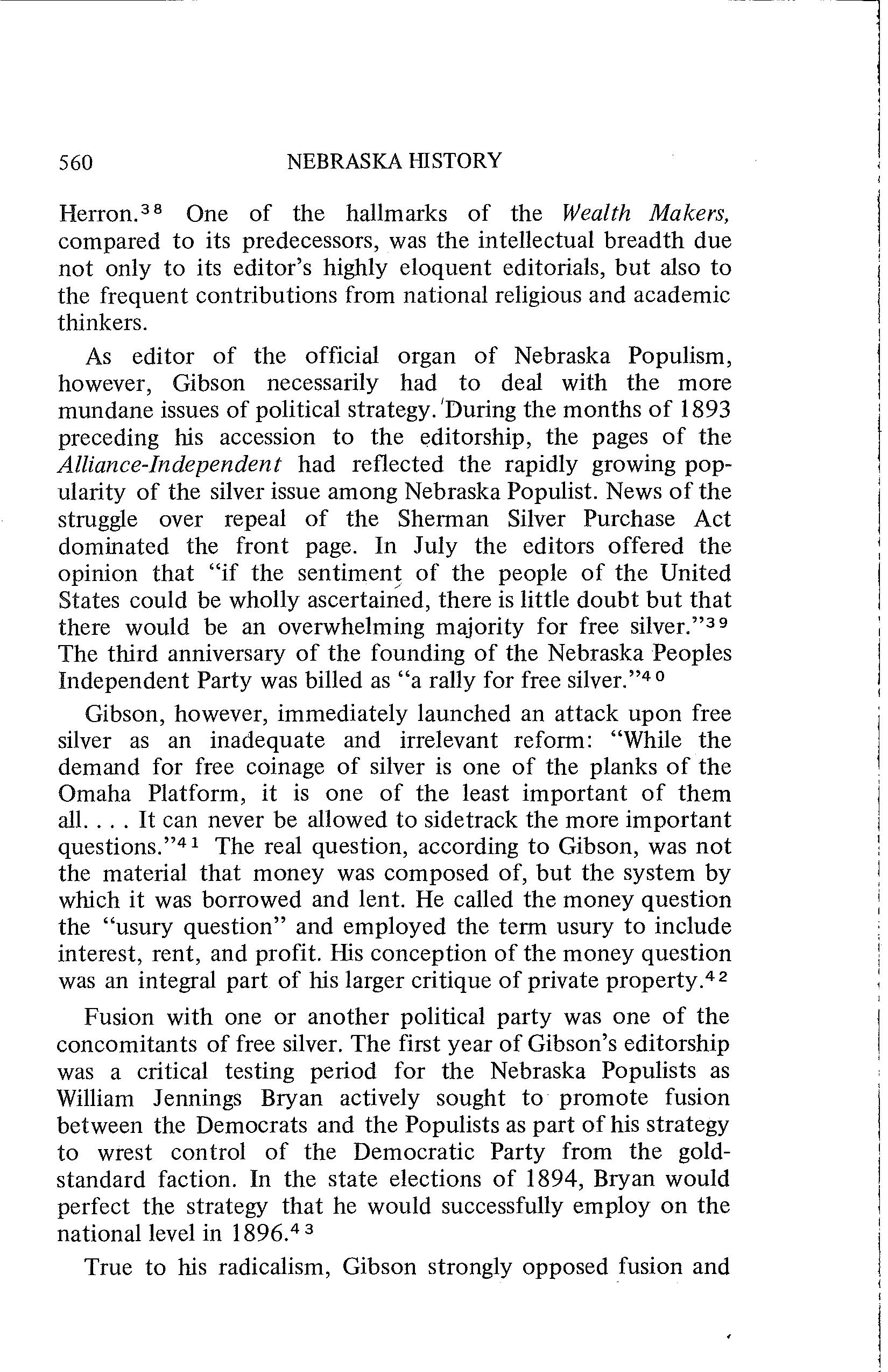
560 NEBRASKA IDSTORY
Herron. 38 One of the hallmarks of the Wealth Makers, compared to its predecessors, was the intellectual breadth due not only to its editor's highly eloquent editorials, but also to the frequent contributions from national religious and academic thinkers.
As editor of the official organ of Nebraska Populism, however, Gibson necessarily had to deal with the more mundane issues of political strategy.'During the months of 1893 preceding his accession to the editorship, the pages of the Alliance-Independent had reflected the rapidly growing popularity of the silver issue among Nebraska Populist. News of the struggle over repeal of the Sherman Silver Purchase Act dominated the front page. In July the editors offered the opinion that "if the sentiment of the people of the United States could be wholly ascertained, there is little doubt but that there would be an overwhelming majority for free silver." 39 The third anniversary of the founding of the Nebraska Peoples Independent Party was billed as "a rally for free silver. " 4 0
Gibson, however, immediately launched an attack upon free silver as an inadequate and irrelevant reform: "While the demand for free coinage of silver is one of the planks of the Omaha Platform, it is one of the least important of them all. ... It can never be allowed to sidetrack the more important questions. " 4 1 The real question, according to Gibson, was not the material that money was composed of, but the system by which it was borrowed and lent. He called the money question the "usury question" and employed the term usury to include interest, rent, and profit. His conception of the money question was an integral part of his larger critique of private property. 42
Fusion with one or another political party was one of the concomitants of free silver. The first year of Gibson's editorship was a critical testing period for the Nebraska Populists as William Jennings Bryan actively sought to promote fusion between the Democrats and the Populists as part of his strategy to wrest control of the Democratic Party from the goldstandard faction. In the state elections of 1894, Bryan would perfect the strategy that he would successfully employ on the national level in 1896. 4 3
True to his radicalism, Gibson strongly opposed fusion and
l
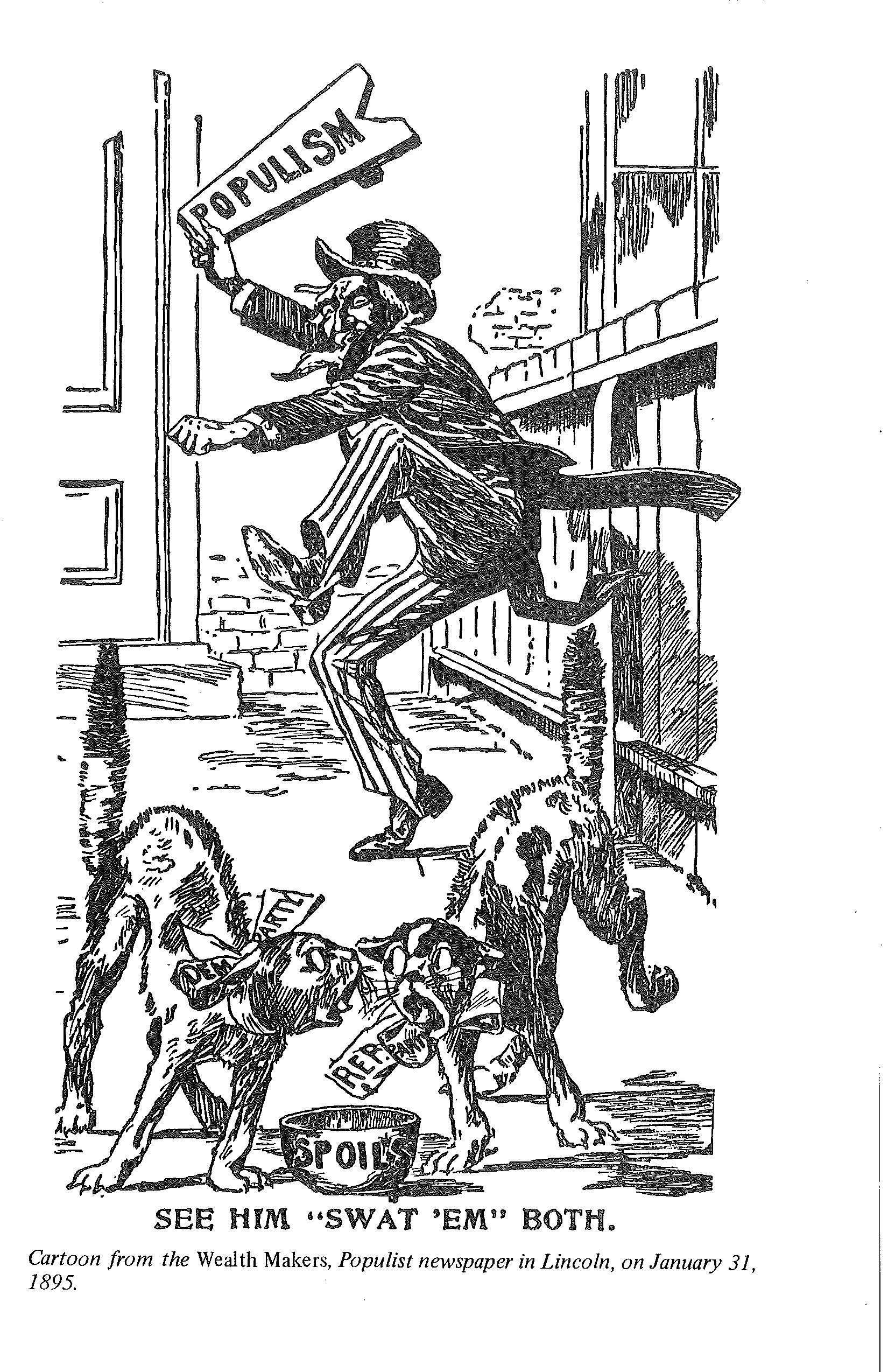
-
SEE HIM "SWAT ,EM" BOTH.
Cartoon from the Wealth Makers, Populist newspaper in Lincoln, on January 31, 1895.
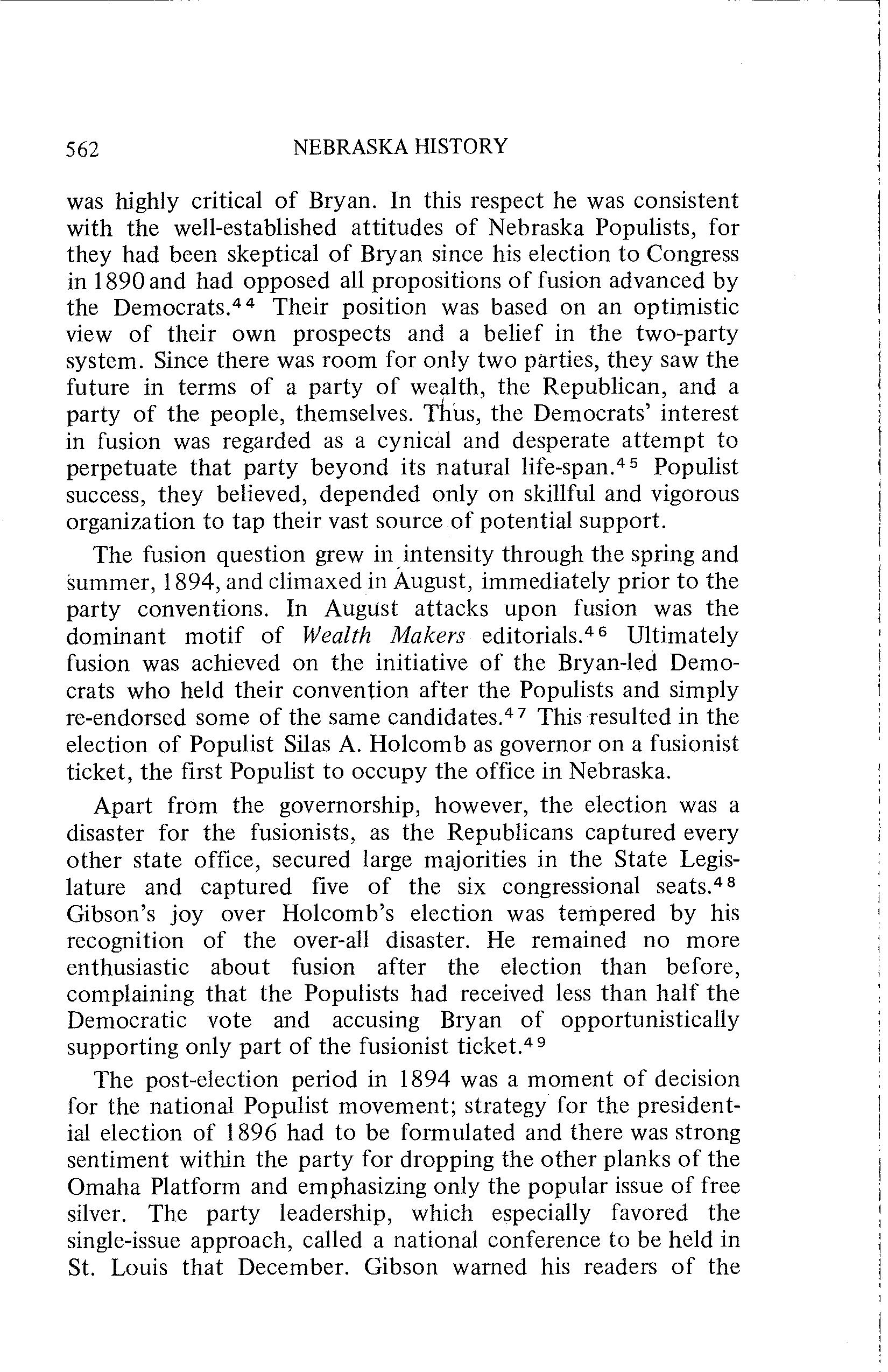
562 NEBRASKA HISTORY
was highly critical of Bryan. In this respect he was consistent with the well-established attitudes of Nebraska Populists, for they had been skeptical of Bryan since his election to Congress in 1890 and had opposed all propositions of fusion advanced by the Democrats. 44 Their position was based on an optimistic view of their own prospects and a belief in the two-party system. Since there was room for only two parties, they saw the future in terms of a party of wealth, the Republican, and a party of the people, themselves. Thus, the Democrats' interest in fusion was regarded as a cynical and desperate attempt to perpetuate that party beyond its natural life-span. 4 5 Populist success, they believed, depended only on skillful and vigorous organization to tap their vast source of potential support.
The fusion question grew in intensity through the spring and summer, 1894, and climaxed in August, immediately prior to the party conventions. In August attacks upon fusion was the dominant motif of Wealth Makers editorials. 4 6 Ultimately fusion was achieved on the initiative of the Bryan-led Democrats who held their convention after the Populists and simply re-endorsed some of the same candidates. 47 This resulted in the election of Populist Silas A. Hole om b as governor on a fusionist ticket, the first Populist to occupy the office in Nebraska.
Apart from the governorship, however, the election was a disaster for the fusionists, as the Republicans captured every other state office, secured large majorities in the State Legislature and captured five of the six congressional seats. 4 8 Gibson's joy over Holcomb's election was tempered by his recognition of the over-all disaster. He remained no more enthusiastic about fusion after the election than before, complaining that the Populists had received less than half the Democratic vote and accusing Bryan of opportunistically supporting only part of the fusionist ticket. 4 9
The post-election period in 1894 was a moment of decision for the national Populist movement; strategy for the presidential election of 1896 had to be formulated and there was strong sentiment within the party for dropping the other planks of the Omaha Platform and emphasizing only the popular issue of free silver. The party leadership, which especially favored the single-issue approach, called a national conference to be held in St. Louis that December. Gibson warned his readers of the
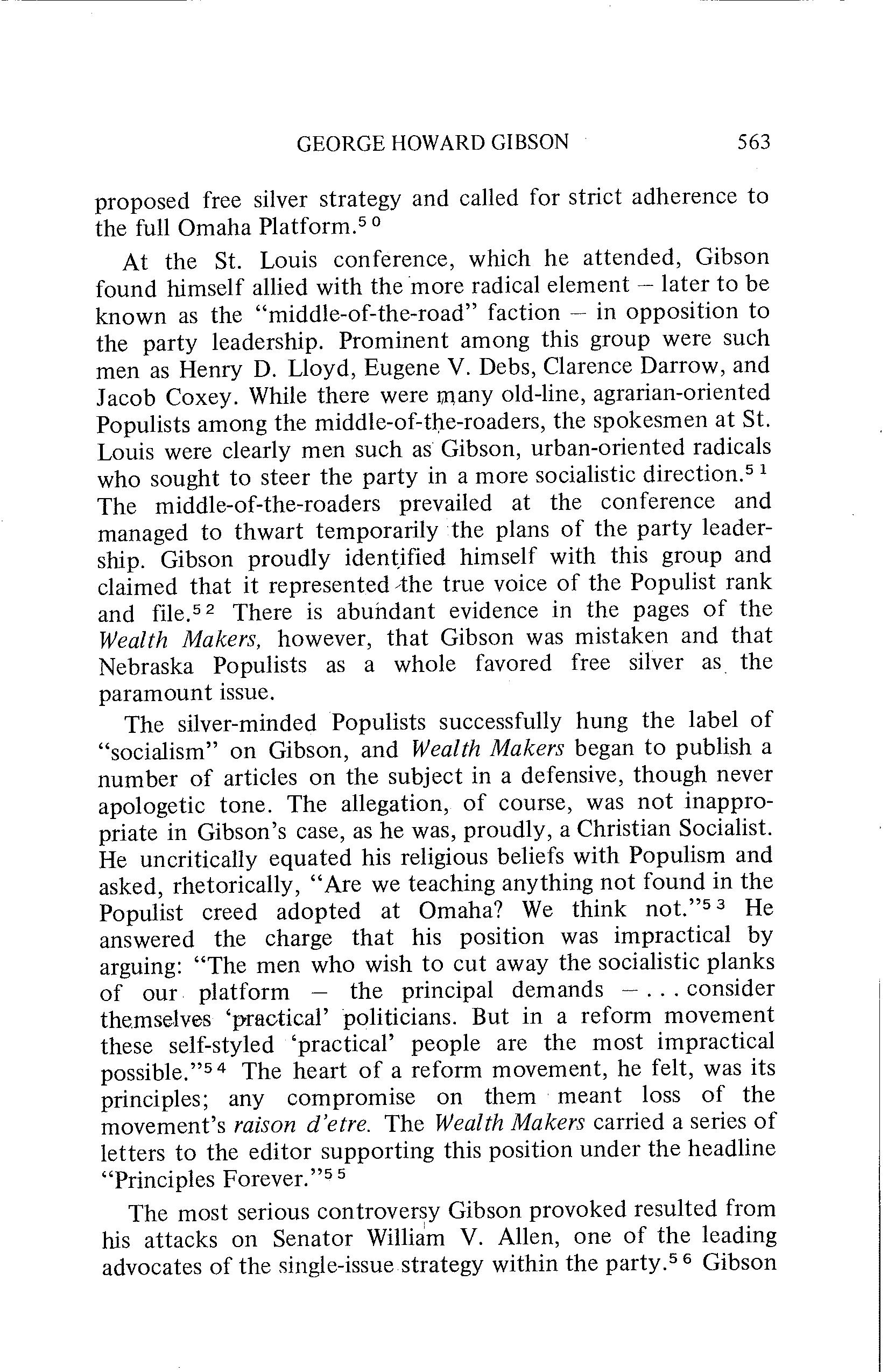
GEORGE HOWARD GIBSON 563
proposed free silver strategy and called for strict adherence to the full Omaha Platform. 5 o
At the St. Louis conference, which he attended, Gibson found himself allied with the more radical element - later to be known as the "middle-of-the-road" faction - in opposition to the party leadership. Prominent among this group were such men as Henry D. Lloyd, Eugene V. Debs, Clarence Darrow, and Jacob Coxey. While there were r,n,any old-line, agrarian-oriented Populists among the middle-of-t.l).e-roaders, the spokesmen at St. Louis were clearly men such as Gibson, urban-oriented radicals who sought to steer the party in a more socialistic direction. 5 1 The middle-of-the-roaders prevailed at the conference and managed to thwart temporarily the plans of the party leadership. Gibson proudly ident_ified himself with this group and claimed that it represented /the true voice of the Populist rank and file. 52 There is abundant evidence in the pages of the Wealth Makers, however, that Gibson was mistaken and that Nebraska Populists as a whole favored free silver as. the paramount issue.
The silver-minded Populists successfully hung the label of "socialism" on Gibson, and Wealth Makers began to publish a number of articles on the subject in a defensive, though never apologetic tone. The allegation, of course, was not inappropriate in Gibson's case, as he was, proudly, a Christian Socialist. He uncritically equated his religious beliefs with Populism and asked, rhetorically, "Are we teaching anything not found in the Populist creed adopted at Omaha? We think not." 5 3 He answered the charge that his position was impractical by arguing: "The men who wish to cut away the socialistic planks of our platform - the principal demands ... consider themselves 'practical' politicians. But in a reform movement these self-styled 'practical' people are the most impractical possible." 54 The heart of a reform movement, he felt, was its principles; any compromise on them meant loss of the movement's raison d'etre. The Wealth Makers carried a series of letters to the editor supporting this position under the headline "Principles Forever. " 5 5
The most serious controversy Gibson provoked resulted from his attacks on Senator William V. Allen, one of the leading advocates of the single-issue strategy within the party. 56 Gibson

564 NEBRASKA HISTORY
accused him of arbitrarily dispensing with the Omaha Platform in public addresses and substituting one of his own making, an act of "gross, unpardonable misrepresentation." 57 Senator Allen defended his position in a lengthy letter and said directly to Gibson: "I do not sympathize with your purpose of mingling socialism and political vagaries with the doctrines of the Populist Party." In an even longer letter Gibson replied, "Mr. Allen asks us to keep socialism out of'the Wealth Makers. What he means by socialism he does not say. But if he wishes us to quit advocating the sort of socialism that is found in the Omaha Platform and Christianity, we shall have to be excused." 5 8
In addition to the growing controversy within the Populist movement, Gibson's tenure also coincided with the social and economic turmoil resulting from tpe severe depression that had struck the nation in early 1893. The depression only confirmed his opinion of contemporary economic institutions: "This army of unemployed is a necessary part of the capitalistic system." He called for immediate relief through federal public works, 59 and he looked with favor upon General Jacob Coxey's Commonweal Army which marched on Washington in 1894 with a similar demand. 6 0 The Wealth Makers also offered sympathetic coverage of Kelley's Army, the midwestern branch of the Commonweal, which passed through Nebraska. 61
Also during 1894 Eugene V. Debs organized the American Railway Union (ARU) and led it in a momentous strike against the Pullman Company. Gibson hailed the formation of the ARU: "In behalf of people in Nebraska we reach out earnest hands of brotherhood to those whose cooperative and educational lines of labor converge and agree with ours. The interests of the producing classes are one and indivisible. " 6 2 His emphasis on the "cooperative and educational" efforts of the ARU revealed the limits of his support for organized labor. While he sympathized with the economically distressed and proclaimed the solidarity of interests among the producing classes, he found it difficult to accept their organizations completely. His complaint was that labor unions accepted the capitalist wage system and the ideologies of individualism and competition; the failure of unions he attributed to their unwillingness to adopt an ethic of cooperation. 6 3 Similarly he attributed the collapse of the Farmers' Alliance in the 1890's to
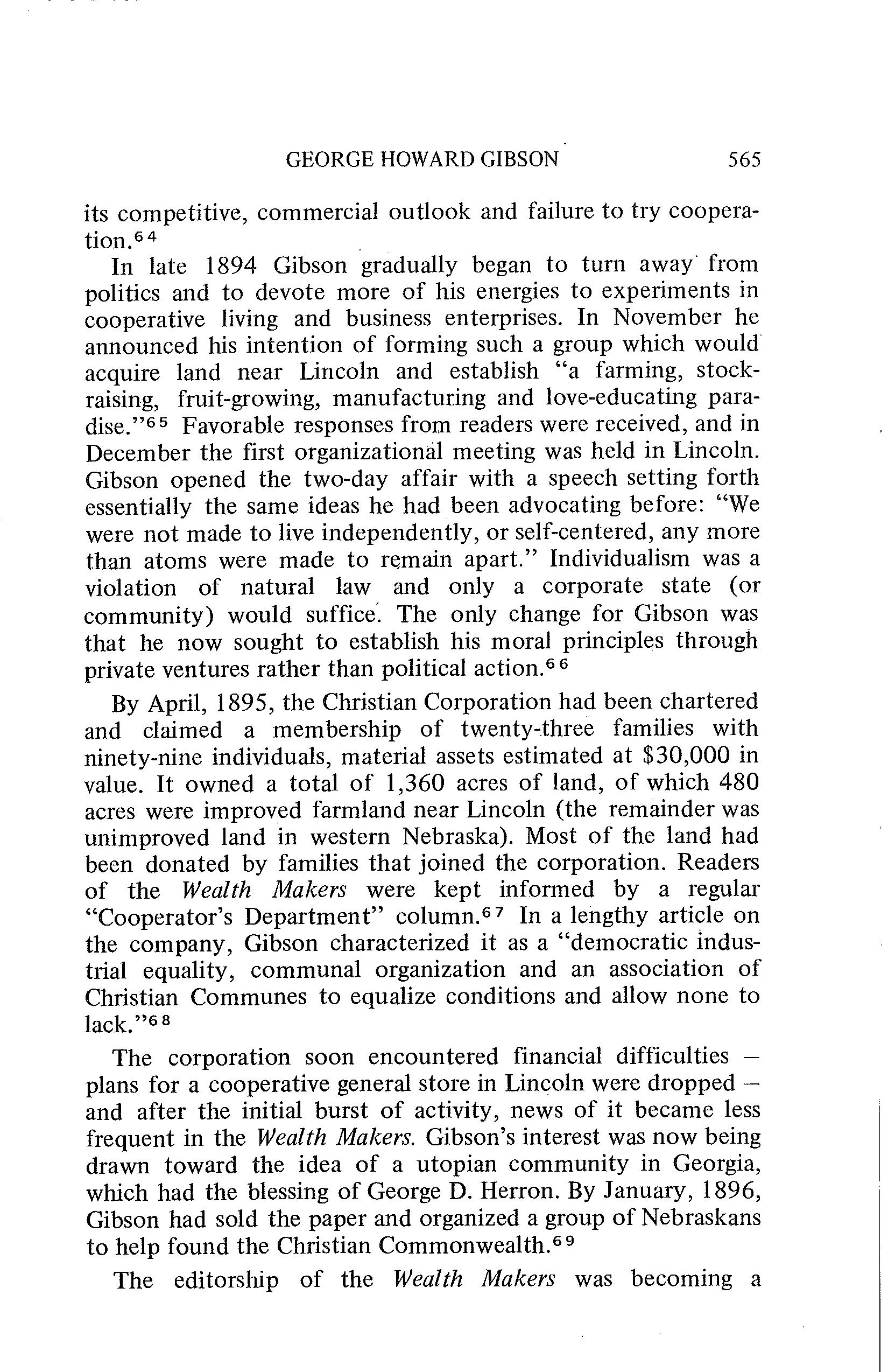
GEORGE HOWARD GIBSON
its competitive, commercial outlook and failure to try cooperation. 6 4
In late 1894 Gibson gradually began to turn away from politics and to devote more of his energies to experiments in cooperative living and business enterprises. In November he announced his intention of forming such a group which would acquire land near Lincoln and establish "a farming, stockraising, fruit-growing, manufacturing and love-educating paradise."65 Favorable responses from readers were received, and in December the first organizational meeting was held in Lincoln. Gibson opened the two-day affair with a speech setting forth essentially the same ideas he had been advocating before: "We were not made to live independently, or self-centered, any more than atoms were made to apart." Individualism was a violation of natural law and only a corporate state (or community) would suffice'. The only change for Gibson was that he now sought to establish his moral principles through private ventures rather than political action. 6 6
By April, 1895, the Christian Corporation had been chartered and claimed a membership of twenty-three families with ninety-nine individuals, material assets estimated at $30,000 in value. It owned a total of 1,360 acres of land, of which 480 acres were improved farmland near Lincoln (the remainder was unimproved land in western Nebraska). Most of the land had been donated by families that joined the corporation. Readers of the Wealth Makers were kept informed by a regular "Cooperator's Department" column. 6 7 In a lengthy article on the company, Gibson characterized it as a "democratic industrial equality, communal organization and an association of Christian Communes to equalize conditions and allow none to lack." 68
The corporation soon encountered financial difficultiesplans for a cooperative general store in Lincoln were droppedand after the initial burst of activity, news of it became less frequent in the Wealth Makers. Gibson's interest was now being drawn toward the idea of a utopian community in Georgia, which had the blessing of George D. Herron. By January, 1896, Gibson had sold the paper and organized a group of Nebraskans to help found the Christian Commonwealth. 6 9
The editorship of the Wealth Makers was becoming a
565
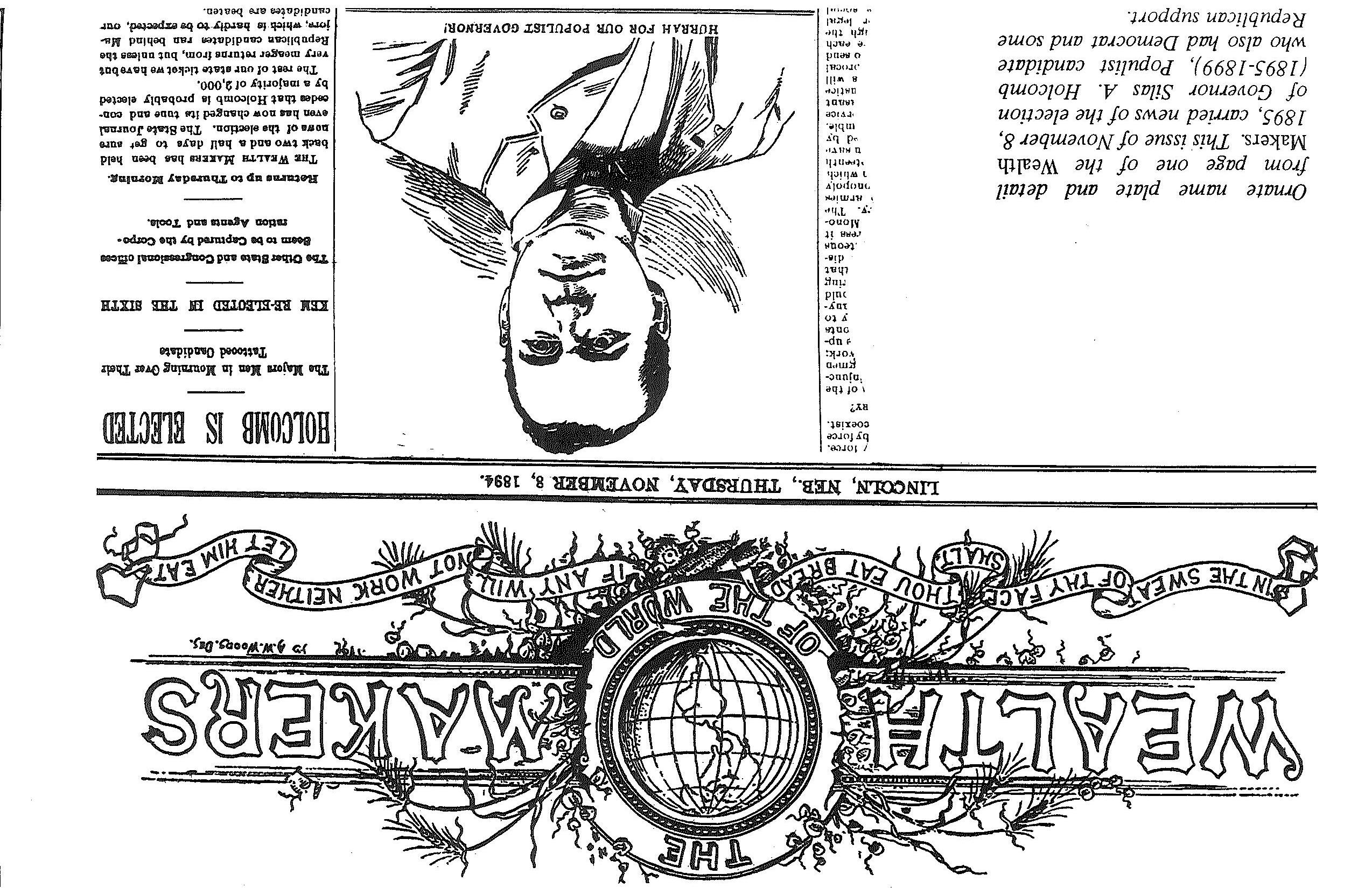
Ornate name plate and detail from page one of the Wealth Makers. This issue of November 8, 1895, carried news of the election of Governor Silas A. Holcomb ( 1895-1899 ), Populist candidate who also had Democrat and some Republican support.
LINCOLN, nB., THUESDAY, NOVEMBER 8, 1894.
1 lort-e. by coexist.
RY?
1 of 'upon"' y to 1ny· mid that dill· .t.f."Ot\tl t'f'RR it Alono:,v. Th1•
• 'lnopol.v 1 wldr.b •tf'f'nth
U MH'\'"1' ->d tn· mbl;.
•rVICe tAll.Dt a1-1tic-..
8 will ,H'OCaJ
0 tw.llci ·f.o Pnrh lg-h ttw
n. Otllwlltata o!!!css 11eom to be CaptuDd by tho Ccrpo• tatloD Agonta ODd Tools.
Retara.a ap to Th111'8day
Tn WEll.TB MAKERS bB.B bf!en held baek two and a baU days to get aure .uowa of the eleetlDn. The State Journe.l. even bas now changed lbJ tune and eoneedea that Holcomb Is probably 4!lected by a tnajority of 2,000.
The reet of our state tickot we have bot very meager returns from, but on lese tbe Republican candidate<! ran behind Jda. j.,.., wbieb Is bat'dlyto <mr ca.ndldniea are beaten.
=
!======-==========---======= HOLCOMB IS ELECTED The Hllim Ken In Mo1ll'lrlng .. Tholl T•tlooed Or.ndid.&te 1m[ RE-ELEOTllD Ill! TID! SIXTH

GEORGE HOWARD GIBSON
millstone around Gibson's neck by 1895. Not only was he increasingly isolated politically, but the paper was again in serious financial trouble. From a circulation of over 23,000 in early 1893, the Wealth Makers had suffered a spectacular decline to 8,123 by late 1894 and to 4,500 by December, 1895. 70 Part of this decline could be attributed to the depression, but most of it was undoubtedly due to Gibson's eccentric political views. The official organ was simply' not representative of the movement as a whole, either on immediate issues or on fundamental principles. The Wahoo New Era, a Populist paper, complained:
The Populist papers are very much dissatisfied with the way in which the Wealth Makers of Lincoln has been abusing its privilege as an organ of the Populist Party, and seem to think that Mr. Gibson is hardly the proper person to turn the crank.71
Significantly, the New Era was intensely anti-fusionist at the time and, therefore, did not even represent the more moderate wing of Nebraska Populism. Furthermore, while the Wealth Makers was losing nearly two-thirds of its circulation, the New Era managed to gain slightly.
Harassed by political isolation and financial difficulties, disillusioned with politics, and captivated by the idea of a self-sufficient cooperative community, Gibson sold the Wealth Makers and left the Populist movement. His farewell "valedictory" eloquently expressed his feelings:
I have more and more grown to dislike politics, even the politics of a reform party, for reasons that I need not mention I think I can do more thorough, deeper, fundamental social work as an investigating moralist. I consider our whole commercial system and civilization wrong. I have come to believe, lately, that attempts to patch it up politically, by legislation, can never make it right. A new foundation must be laid. A new system, a new society, on the opposite principle. must be started, to save the people. Some one, some few, must begin this work .... I am one who feels morally drawn to drop out of sight, out of notice, out of reputation for a time, to dig deep, to lay the foundations for a new order.72
The new owners merged the Wealth. Makers with the Independent, another Populist paper in Lincoln, and published it as the Nebraska Independent. In their first issue along side Gibson's farewell, they took a few pointed shots at the departed editor:
In politics the paper will support the principles of the Peoples Party. It will advocate or favor no faction and none of the impracticable issues; but will stand squarely upon the Populist Platform. In national affairs it will advocate especially the free coinage
567
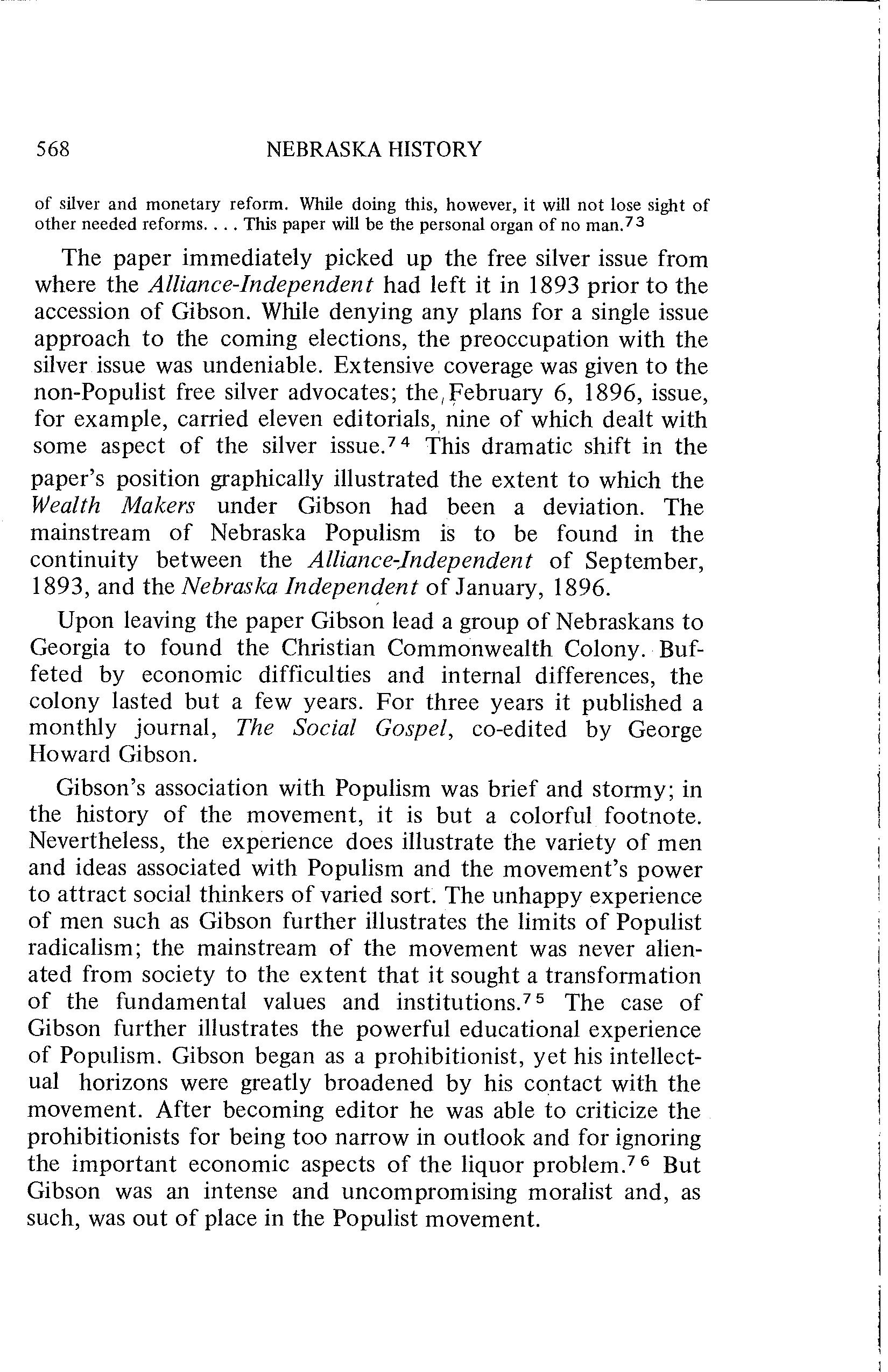
568 NEBRASKA HISTORY
of silver and monetary reform. While doing this, however, it will not lose sight of other needed reforms This paper will be the personal organ of no man. 7 3
The paper immediately picked up the free silver issue from where the Alliance-Independent had left it in 1893 prior to the accession of Gibson. While denying any plans for a single issue approach to the coming elections, the preoccupation with the silver issue was undeniable. Extensive coverage was given to the non-Populist free silver advocates; the,Februaty 6, 1896, issue, for example, carried eleven editorials, nine of which dealt with some aspect of the silver issue. 7 4 This dramatic shift in the paper's position graphically illustrated the extent to which the Wealth Makers under Gibson had been a deviation. The mainstream of Nebraska Populism is to be found in the continuity between the Alliance-Independent of September, 1893, and the Nebraska Independent of January, 1896.
Upon leaving the paper Gibson lead a group of Nebraskans to Georgia to found the Christian Commonwealth Colony. Buffeted by economic difficulties and internal differences, the colony lasted but a few years. For three years it published a monthly journal, The Social Gospel, co-edited by George Howard Gibson.
Gibson's association with Populism was brief and stormy; in the history of the movement, it is but a colorful footnote. Nevertheless, the experience does illustrate the variety of men and ideas associated with Populism and the movement's power to attract social thinkers of varied sort. The unhappy experience of men such as Gibson further illustrates the limits of Populist radicalism; the mainstream of the movement was never alienated from society to the extent that it sought a transformation of the fundamental values and institutions.7 5 The case of Gibson further illustrates the powerful educational experience of Populism. Gibson began as a prohibitionist, yet his intellectual horizons were greatly broadened by his contact with the movement. After becoming editor he was able to criticize the prohibitionists for being too narrow in outlook and for ignoring the important economic aspects of the liquor problem.7 6 But Gibson was an intense and uncompromising moralist and, as such, was out of place in the Populist movement.

GEORGE HOWARD GIBSON
NOTES
1. Richard Hofstadter, The Age of Reform: From Bryan to F.D.R., Vintage Books (New York: Random House, 1955), 61.
2. This author's research into Nebraska Populism has confirmed the prevailing consensus that the movement's ideology was individualistic and capitalistic; Hicks called it: "An essentially individualistic philosophy ... designed merely to insure for every man his right to 'get ahead' in to world." John D. Hicks, The Populist Revolt: A History of the Farmers' Alliance and the People's Party, Bison Books (Lincoln: University of Nebraska Press, 1961), 422. Other scholars have reached essentially the same conclusions: Hofstadter, The Age of f?.eform, 58; C. Vann Woodward, Tom Watson: Agrarian Rebel (New York: Macmillan, 1938), 217; Walter T.K. Nugent, The Tolerant Populists: Kansas Populism and Nativism (Chicago: University of Chicago Press, 1963), 95; Robert F. Durden, The Climax of Populism: The Election of I896 (Lexington: University of Kentucky Press, 1966), 3. The only exception to this consensus is Norman Pollack, The Populist Response to Industrial America, Norton Library (New York: W. W. Norton, 23, who finds the Populists socialistic. The most complete study of Nebraska Populism is Stanley B. Parsons, The Populist Context: Rural Versus Urban Power on a Great Plains Frontier (Westport, Conn.: Greenwood Press, 1973). See also David S. Trask, "The Nebraska Populist Party: A Social and Political Analysis," Ph.D. dissertation, University of Nebraska-Lincoln, 1971.
3. Henry Demarest Lloyd's involvement with Populism has been well documented in Chester MacArthur Destler, Henry Demarest Lloyd and the Empire of Reform (Philadelphia: University of Pennsylvania Press, 1963), 263-289, and American Radicalism, I865-I90I, Quadrangle Paperbacks (Chicago: Quadrangle Books, 1966), 162-254. Destler, however, tends to be somewhat uncritical in exaggerating the significance of the labor-Populist alliance that Lloyd promoted.
4. The official organ of Nebraska Populism published under five different names during the decade of the 1890's·. The many changes reflected the impecunious state of the movement as the paper was constantly reorganizing and changing hands. Beginning as the Alliance in 1889, it became the Farmers' Alliance in 1890, the Alliance-Independent in 1892, the Wealth Makers in 1894, and, finally, the Nebraska Independent in 1896. Consecutive edition numbering was maintained without interruption, however, and the paper never lost its designation as the official organ of the Farmers' Alliance and the Peoples Independent Party.
5. Gibson's uniqueness was entirely missed by Clifford Earnest Bowman in his dissertation on the Nebraska press for this period; "He expressed opinions and policies close to those of his predecessors." Clifford Earnest Bowman, "The Local Nebraska Press and National Politics" (Ph.D. dissertation, University of Nebraska, 1964), 40.
6. James W. Savage and John T. Bell, History of the Ci(y of Omaha, Nebraska and South Omaha (New York and Chicago: Munsell & Co., 1894), 172.
7. Gibson's previous contributions to the paper were summarized by the publishers, Alliance-Independent, October 5, 1893.
8. Addison Erwin Sheldon, Nebraska, The Land and The People, I (Chicago & New York: Lewis Publishing Co., 1931), 743-744.
9. Alliance-Independent, October 5, 1893.
569
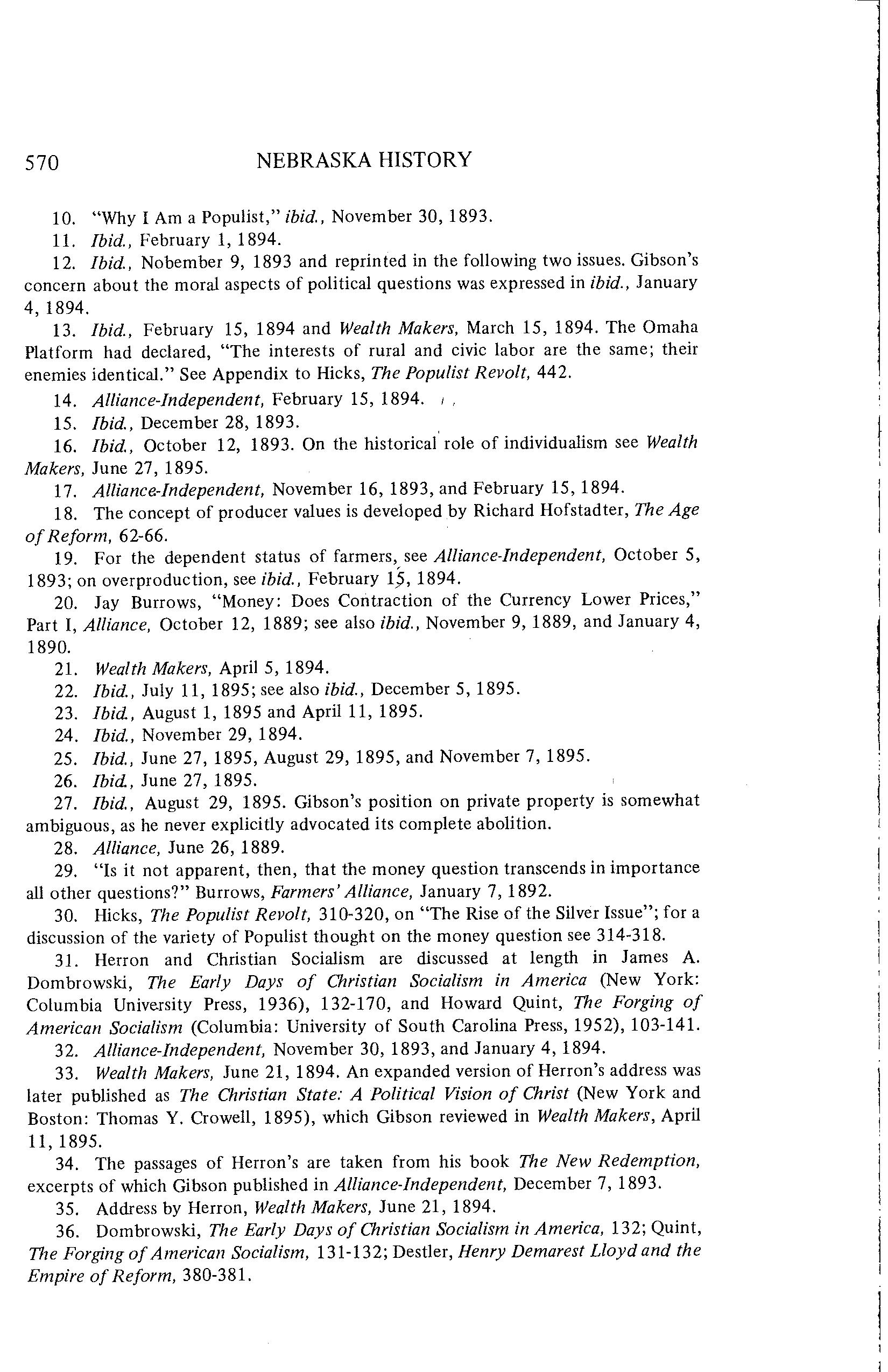
570 NEBRASKA HISTORY
10. "Why I Am a Populist," ibid., November 30, 1893.
11. Ibid., February 1, 1894.
12. Ibid., Nobember 9, 1893 and reprinted in the following two issues. Gibson's concern about the moral aspects of political questions was expressed in ibid., January 4, 1894.
13. Ibid., February 15, 1894 and Wealth Makers, March 15, 1894. The Omaha Platform had declared, "The interests of rural and civic labor are the same; their enemies identical." See Appendix to Hicks, The Populist Revolt, 442.
14. Alliance-Independent, February 15, 1894. ' ,
15. Ibid., December 28, 1893.
16. Ibid., October 12, 1893. On the historical' role of individualism see Wealth Makers, June 27, 1895.
17. Alliance-Independent, November 16, 1893, and February 15, 1894.
18. The concept of producer values is developed by Richard Hofstadter, The Age of Reform, 62-66.
19. For the dependent status of farmers, see Alliance-Independent, October 5, 1893; on overproduction, see ibid., February li;, 1894.
20. Jay Burrows, "Money: Does Contraction of the Currency Lower Prices," Part I, Alliance, October 12, 1889; see also ibid., November 9, 1889, and January 4, 1890.
21. Wealth Makers, April 5, 1894.
22. Ibid., July 11, 1895; see also ibid., December 5, 1895.
23. Ibid., August 1, 1895 and April11, 1895.
24. Ibid., November 29, 1894.
25. Ibid., June 27, 1895, August 29, 1895, and November 7, 1895.
26. Ibid., June 27, 1895.
27. Ibid., August 29, 1895. Gibson's position on private property is somewhat ambiguous, as he never explicitly advocated its complete abolition.
28. Alliance, June 26, 1889.
29. "Is it not apparent, then, that the money question transcends in importance all other questions?" Burrows, Farmers' Alliance, January 7, 1892.
30. Hicks, The Populist Revolt, 310-320, on "The Rise of the Silver Issue"; for a discussion of the variety of Populist thought on the money question see 314-318.
31. Herron and Christian Socialism are discussed at length in James A. Dombrowski, The Early Days of Christian Socialism in America (New York: Columbia University Press, 1936), 132-170, and Howard Quint, The Forging of American Socialism (Columbia: University of South Carolina Press, 1952), 103-141.
32. Alliance-Independent, November 30, 1893, and January 4, 1894.
33. Wealth Makers, June 21, 1894. An expanded version of Herron's address was later published as The Christian State: A Political Vision of Christ (New York and Boston: Thomas Y. Crowell, 1895), which Gibson reviewed in Wealth Makers, April 11, 1895.
34. The passages of Herron's are taken from his book The New Redemption, excerpts of which Gibson published in Alliance-Independent, December 7, 1893.
35. Address by Herron, Wealth Makers, June 21, 1894.
36. Dombrowski, The Early Days of Christian Socialism in America, 132; Quint, The Forging of American Socialism, 131-132; Destler, Henry Demarest Lloyd and the Empire of Reform, 380-381.
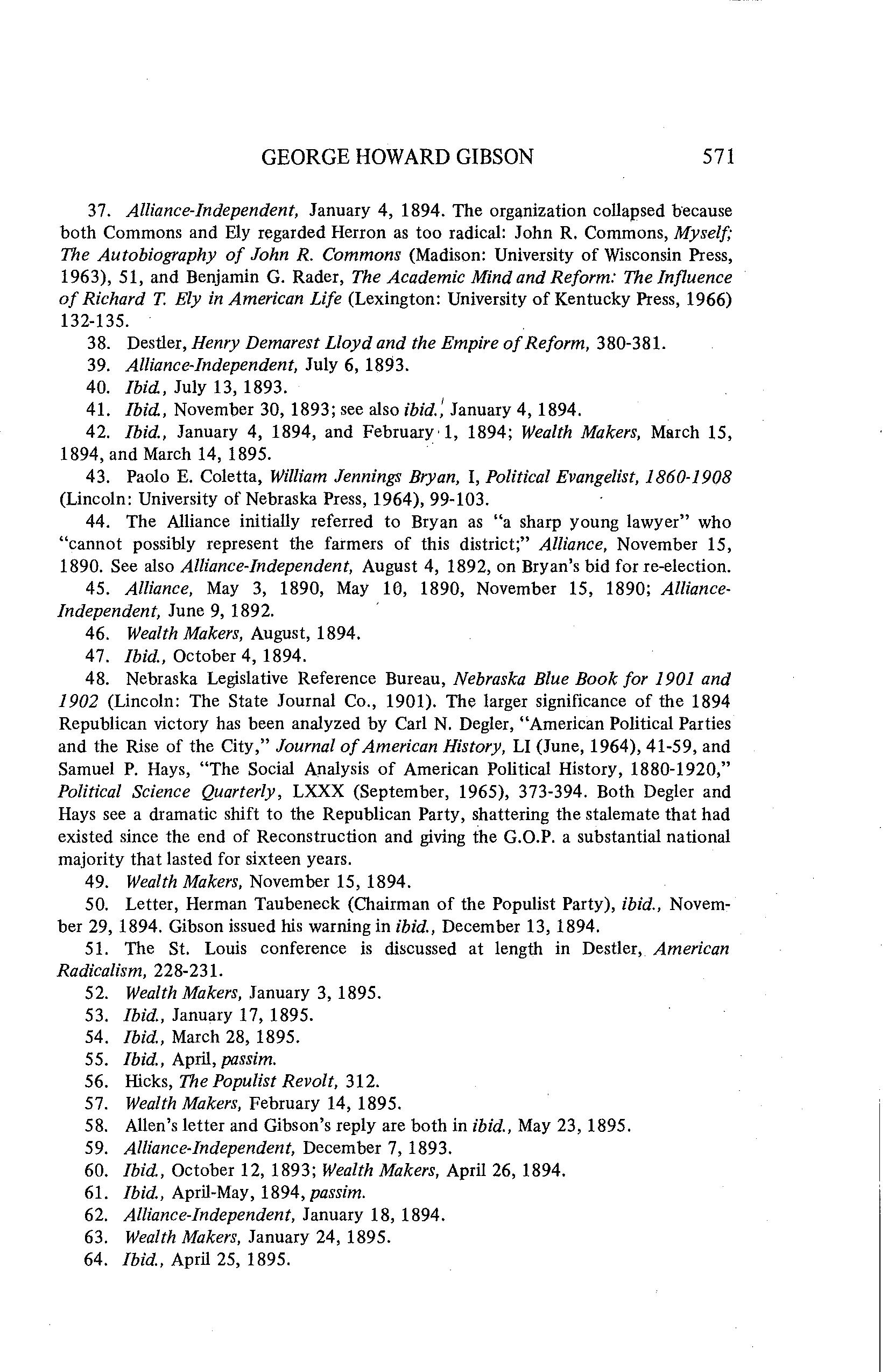
GEORGE HOWARD GIBSON 571
37. Alliance-Independent, January 4, 1894. The organization collapsed hecause both Commons and Ely regarded Herron as too radical: John R. Commons, Myself; The Autobiography of John R. Commons (Madison: University of Wisconsin Press, 1963), 51, and Benjamin G. Rader, The Academic Mind and Reform: The Influence of Richard T. Ely in American Life (Lexington: University of Kentucky Press, 1966) 132-135.
38. Destler, Henry Demarest Lloyd and the Empire of Reform, 380-381.
39. Alliance-Independent, July 6, 1893.
40. Ibid, July 13, 1893.
41. Ibid, November 30, 1893; see also ibid.; January 4, 1894.
42. Ibid., January 4, 1894, and February· 1, 1894; Wealth Makers, March 15, 1894, and March 14, 1895. ·
43. Paolo E. Coletta, William Jennings Bryan, I, Political Evangelist, 1860-1908 (Lincoln: University of Nebraska Press, 1964), 99-103.
44. The Alliance initially referred to Bryan as "a sharp young lawyer" who "cannot possibly represent the farmers of this district;" Alliance, November 15, 1890. See also Alliance-Independent, August 4, 1892, on Bryan's bid for re-election.
45. Alliance, May 3, 1890, May Hl, 1890, November 15, 1890; AllianceIndependent, June 9, 1892.
46. Wealth Makers, August, 1894.
47. Ibid., October 4, 1894.
48. Nebraska Legislative Reference Bureau, Nebraska Blue Book for 1901 and 1902 (Lincoln: The State Journal Co., 1901). The larger significance of the 1894 Republican victory has been analyzed by Carl N. Degler, "American Political Parties and the Rise of the City," Journal of American History, LI (June, 1964), 41-59, and Samuel P. Hays, "The Social Analysis of American Political History, 1880-1920," Political Science Quarterly, LXXX (September, 1965), 373-394. Both Degler and Hays see a dramatic shift to the Republican Party, shattering the stalemate that had existed since the end of Reconstruction and giving the G.O.P. a substantial national majority that lasted for sixteen years.
49. Wealth Makers, November 15, 1894.
50. Letter, Herman Taubeneck (Chairman of the Populist Party), ibid., November 29, 1894. Gibson issued his warning in ibid., December 13, 1894.
51. The St. Louis conference is discussed at length in Destler, American Radicalism, 228-231.
52. Wealth Makers, January 3, 1895.
53. Ibid., January 17, 1895.
54. Ibid., March 28, 1895.
55. Ibid., April, passim.
56. Hicks, The Populist Revolt, 312.
57. Wealth Makers, February 14, 1895.
58. Allen's letter and Gibson's reply are both in ibid., May 23, 1895.
59. Alliance-Independent, December 7, 1893.
60. Ibid, October 12, 1893; Wealth Makers, April 26, 1894.
61. Ibid., April-May, 1894, passim.
62. Alliance-Independent, January 18, 1894.
63. Wealth Makers, January 24, 1895.
64. Ibid., April 25, 1895.

NEBRASKA HISTORY
65. Ibid., November 8, 1894.
66. Ibid., December 20, 1894.
67. The "Cooperators Department" ran regularly from February through April, 1895. The details of the corporation's assets were discussed in ibid., Apri118, 1895.
68. Ibid., July 18, 1895. ·
69. Dombrowski, The Early Days of Christian Socialism in America, 132; Destler, Henry Demarest Lloyd and the Emprie of Reform, 380-381.
70. The 1893 and 1894 circulation figures were carried on the editorial page of the newspaper; the 1895 figure was revealed in a letter from the business manager offering the paper for sale. Letter, J. Hyatt, 23, 1895, Nebraska Farmers' Alliance Papers, 1887-1901. Nebraska State Historical Society, Lincoln, Nebraska.
71. New Era (Wahoo, Nebraska), June 13, 1895.
72. Nebraska Independent, January 16, 1896.
73. Ibid.
74. Ibid.,February 6, 1896.
75. Howard Quint has grouped Gibson with those he calls "permeation socialists," radicals who sought to gain influence through the Populist movement and who sought to direct the movement in a more socialistic direction. This group included Julius Wyland, publisher of The Coming Nation and Appeal to Reason and one of the links between Populism and Socialism. Quint, The Forging of American Socialism, 21 (}- 212.
76. Wealth Makers, January 25, 1894.
572





















